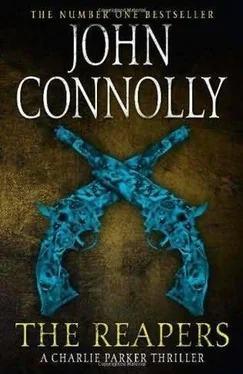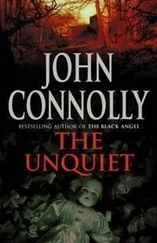And as for why Louis took so long to avenge Errol Rich’s death, well, as he liked to tell Angel, Little Tom was worth killing, but he wasn’t worth traveling very far to kill, so Louis just waited until he happened to be in the neighborhood. It was, he said, a matter of convenience.
That came later, though. For now, he headed west, and he did not stop until he could see and smell the ocean. He found a place in which to live and work, and there he waited for the men to come.
LOUIS WAS EARLY FOR the meeting with Gabriel at Nate’s. He didn’t like being early for encounters of this kind. He preferred to keep people waiting for him, aware always of the potential psychological advantages to be gained in even the most apparently innocuous of encounters. It might have seemed that such precautions would be unnecessary in any meeting between Gabriel and himself, as they had known each other for many years, but both men were acutely aware of how difficult their relationship was. They were not equals, and although Gabriel had been more of a father figure to Louis than any other man in his life, taking the boy under his wing when he was still a teenager, teaching him how to survive in the world by honing his own natural skills, both men understood why he had done so. If one were to regard Louis’s instincts as a form of corruption, his willingness to use violence, even to the point of murder, as moral weakness rather than strength of character, then Gabriel had exploited that corruption, deepening and enhancing it in order to turn Louis into a weapon that could be used effectively against others. Louis was not so naive as to believe that, had he not met Gabriel, he might otherwise have been saved from himself. He knew that, had Gabriel not entered his life, he would probably be dead by now, but he had paid a price for the salvation of sorts offered by the older man. When Louis, the last of the Reapers, had walked away from Gabriel, he had done so with no regrets and without turning his back, and for many years after he had been wary, conscious that there were those who might prefer it if he were silenced forever, and that Gabriel might well be among them.
The old man had been part of Louis’s life for longer than almost anyone else he had known, the few surviving female members of his own family apart, and he kept even them at a distance, salving his conscience by ensuring that they never wanted for money, even as he acknowledged to himself that they had little need of what he sent them and that his gifts were more for his own peace of mind than theirs. But Gabriel had been there from the crucial later years of his adolescence, then all through his adulthood until Louis had severed their ties. Now they were together again, one in his middle age, the other in his declining years. They had seen each other grow older, and it was strange to think that, when they had first met, Gabriel had been younger than Louis himself was now.
Louis glanced at his watch. He was particularly unhappy about being early on this occasion, for he was in no mood to wait. He felt the tension building within himself, but he did not try to dissipate it. He recognized it as anticipation. Louis knew that there was conflict and violence on its way, and his body and mind were preparing for it. The tension was part of that, and it was good. The months of normality, of indolence, of ordinary life, had come to an end. Even when he and Angel had traveled to Maine earlier that year to help Parker deal with the revenger, Merrick, there had been little call for his specialized services, and he had returned to New York frustrated and disappointed. They had been glorified bodyguards, nothing more. Now he and Angel were under threat, and he was preparing to respond. What troubled him was that he did not yet have a clear picture of what form that threat had taken. That was why he was here, waiting in the old bar not far from Willie Brew’s auto shop. Gabriel had promised him clarification and confirmation of the information offered by Hoyle, and Gabriel, whatever his faults, was not one to renege on his promises.
The delivery door at the back of the bar opened with a soft creak, and Gabriel entered. The door had been kept unlocked for him at Louis’s request, Nate leaving them to their own devices in the otherwise empty bar. Nate knew better than to bother them. The bar was another of Louis’s silent investments, a place in which to meet and in which to store some essentials should he ever need to go to ground: cash, a small quantity of diamonds and Krugerrands, a gun and ammunition. They were kept in a locked box in a safe behind shelves in Nate’s office, and only Louis held the combination. He had nests like this in five different locations throughout New York and New England, two of which, this one included, were unknown even to Angel.
Gabriel took a seat and signaled to Nate for a coffee. Nothing was said until the cup arrived and they were alone again. Gabriel sipped at his coffee, his little finger held carefully away from the handle. The old man, thought Louis, had always observed the niceties of civilized behavior, even when he was arranging for men and women to be wiped from the face of the earth.
“Tell me,” said Louis.
Gabriel shifted uneasily.
“Ballantine disappeared on the twelfth. He was under investigation by the SEC. His assets were about to be frozen. Someone, it seems, sent the authorities details of insider trading by companies of which Ballantine was a director. He was facing a series of indictments. It was assumed that he was in hiding, or had fled the jurisdiction.”
“Is there any evidence to suggest otherwise?”
“He has a wife and three children. They have been interviewed, and they seemed genuinely at a loss to explain his absence. He hasn’t been in contact with them. His passport was found in his desk at home. There was a floor safe in one of his closets. His wife didn’t have the combination, or said she didn’t. A court order was obtained to open it. There was nearly one hundred thousand dollars in cash inside, along with almost twice that amount in negotiable bonds.”
“Not the kind of baubles a man on the run would leave behind.”
“Hardly. Especially not so conscientious a family man as Mr. Ballantine.”
Sarcasm dripped like snake venom from Gabriel’s words.
“Too clean to be clean?”
“He owned a house in the Adirondacks through one of his companies. A place in which to entertain clients, one assumes. And to be entertained in turn.”
“Did you find the entertainer?”
“A prostitute. Quite upmarket. She had been advised to keep quiet, even though she knew little enough. Men came. They took Ballantine. They left her.”
“Did you know that he had disappeared before I asked you to look into this?”
Gabriel met Louis’s gaze, but it was a calculated effort.
“I don’t keep up with the activities of all my former clients.”
“That’s a lie.”
Gabriel shrugged. “Not entirely. Some remain on the radar for good reasons, but others I let slide. Ballantine I did not concern myself with. He was an intermediary, nothing more. He used me. On occasion I used him, too, but so did many others. You, of all people, should know how these things work.”
“That’s right. It’s why I’m trying to figure out how much you’ve been hiding from me.”
For the first time since he had arrived, Gabriel smiled. “We all need secrets. Even you.”
“Was Kandic one of yours?”
“No. After you left me, my interest in such matters ceased. There is a new breed of independent contractor out there now, some of them veterans of the conflicts in Chechnya and Bosnia. They’re war criminals. Half of them are on the run from the UN, the other half from their own people. Kandic was running from both. He was a former member of the Scorpions, a Serbian police unit linked to atrocities in the Balkans, but it seems that he had a history to hide long before he began killing old men in Kosovo. When the tide began to turn, he sold out his own comrades to the Muslims and made his way over here. I haven’t yet managed to trace the means by which he was hired by Hoyle.”
Читать дальше












